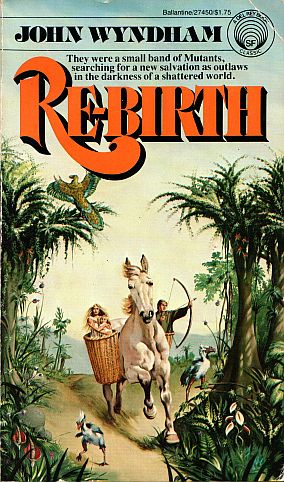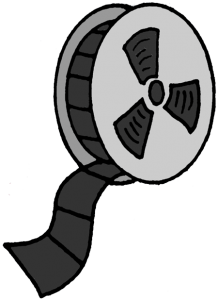
|
| Cover art by Michael Herring |

Film This!

|
| Cover art by Michael Herring |

| RE-BIRTH John Wyndham New York: Ballantine Books, May 1978 |
Rating: 5.0 High |
|||
| ISBN-13: 978-0-345-27450-2 | ||||
| ISBN 0-345-27450-4 | 185pp. | SC | $1.75 | |
• I noticed quite a few grammatical errors, mostly involving missing or extra commas. I did not record all of them. I think they are likely due to the editor of this version of Wyndham's 1955 novel.
• Wyndham paints Waknuk, and the other communities in Labrador, as remarkably primitive in scientific knowledge: lacking much knowledge of world geography, and barely enough mechanical knowledge to support stationary steam engines and muzzle-loader guns. Yet parts of the dialog belie this. On page 39, David calls the solonaceae (the nightshade family, which includes tomatoes) as most prone to Deviations. On page 55, his Uncle Axel, a former sailor, mentions having seen places where there are "big saprophytes growing on rocks, with their roots trailing out on the wind like bunches of hair." How did they learn these more sophisticated terms?
• The Zealand people are technically and scientifically superior: they know about the extinction of the dinosaurs, and know the danger of overflying the glassy areas; yet they apparently don't understand what could have caused those desolate plains. (Prior experience might have taught them about the danger; this would give them no insight into ionizing radation, much less nuclear fission.)
• On page 183, Michael is told that the machine can't make it back to Zealand with him aboard. He pledges to go back for Deborah and "fetch her away" from Waknuk — to Zealand, presumably. At that point, David should tell him, "Look up my Uncle Axel. Talk to him privately." (Although, to be fair, this might be difficult to do given the insular nature of Labrador communities.)
| Page 30: | "They made the promise willingly, eagerly, in fact, as thoug it was a burden they were relieved to share." |
| Typo: S/B "as though". |
| Page 31: | "My father who had had an arrow through his arm early in the campaign, was helping to organize the new volunteers into squads." |
| Missing comma: S/B "father, who". |
| Page 38: | "It must, when it struck have been not unlike a combination of all these disasters with something else, too, which caused a desolation far more frightful than flood and fire." |
| Missing comma: S/B "when it struck, have been". |
| Page 38: | "Above all he must see that the human form is kept true to the divine pattern in order that one day it may be permited to regain the high place in which, as the image of God, it was set." |
| Spelling: S/B "permitted". |
| Page 85: | "Marriage to a Norm, even the kindest and best of them was unthinkable for both of us." |
| Missing comma: S/B "best of them, was". |
| Page 88: | My father and half-uncle Angus, Rosalind's father, had settled down to a regular guerrilla." |
| Missing word: S/B "guerrilla war". |
| Page 114: | "I've left room for you in the other pannier. You can shoot left-handed from there." |
| Presumably this is the pannier on the left side of the greathorse. It makes sense that David would have to shoot to the left, but the assumption that he'd need to shoot left-handed is unwarranted — as well as assuming the ability to shoot a bow with either hand dominant was a thing normally acquired in Waknuk. |
| Page 125: | "The risk of meeting men was not great, but there was the chance encountering of some hunting beast." |
| Word order: S/B "the chance of encountering". |
| Page 179: | "There were some dreadful parts we could not cross, even at great height." |
| How did they know, given that they did not know about ionizing radiation? I think that's a safe assumption. See page 165, where the Zealand woman says, "What did they do here? What can they have done to create such a frightful place?" |

 To contact Chris Winter, send email to this address.
To contact Chris Winter, send email to this address.